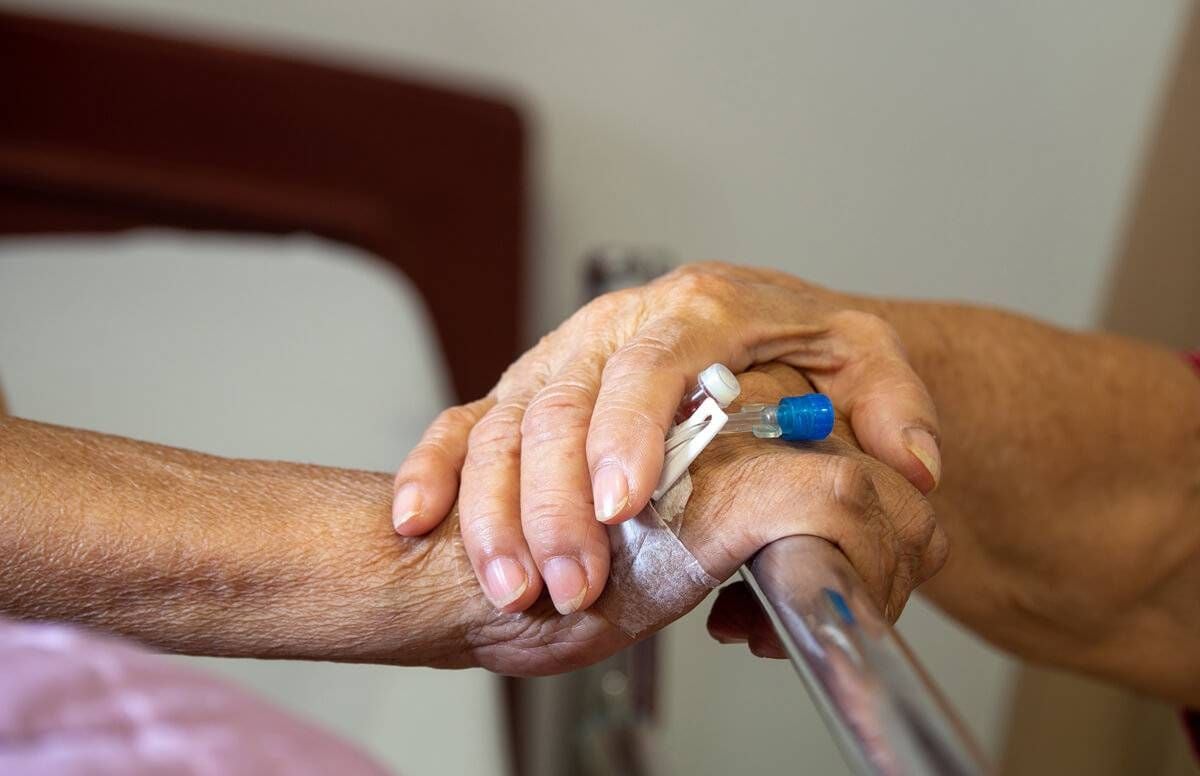Saying Goodbye to a Dying Loved One
Parting is hard not only for us, it's hard for them
It was a bad time, to be sure. My younger sister, Ann, was fading from stage 4 colon cancer, and all I could do — all any of us could do — was to try to keep her comfortable. For months, her friends had been dropping by her home to express their love and their goodbyes. As I kept myself busy sweeping, ironing, and doing anything else I could think of to be useful, I felt privileged to hear their laughter and reminiscences.

My sister was not one to complain. But every so often a look of agony would cross her face. She refused to take pain meds. She insisted they made her feel worse.
In recent weeks, she’d abandoned the second-floor master bedroom in her house and taken to sleeping in her husband’s first-floor office. Stairs had become too much for a 51-year-old woman who had once thru-hiked the Appalachian Trail from Georgia to Maine.
Finding the Right Words
Now, on this summer day in 2010, I sat perched on the office bed with her as she dictated letters to me. These were thank-you notes for a cancer research fundraiser she’d recently participated in. Under Ann’s leadership, her team had out-raised all the other teams.
Ann wanted to thank some of her largest donors. But she knew that each of these notes was also a farewell. Teary, her voice choked with emotion, she struggled to find the right words. At one point, the office phone rang and when I picked it up, I encountered one of her dearest friends, asking to speak with Ann.
When I mouthed the name, Ann shook her her head and mouthed, “No.”
After I hung up, she said, “We already said goodbye. I can’t do it again. It hurts too much.”
I had caught a glimpse of such pain the weekend of the fundraiser, a time when all of my family, save my dying mother, had gathered to support the effort. I’d witnessed my sister’s farewell with my father. She lived in Vermont; he lived in North Carolina. Both of them knew this was the last time they would see each other.
'It Hurts Too Much'
In the moment, I’d been focused on Dad’s expression of agony as he said goodbye — forever — to the youngest of his four children. So many times he’d said to me, “It’s not the natural order of things for a child to die before her parents.” Here it was: the goodbye. I knew a part of him was dying, too.
During that embrace, my sister’s back had been turned to me, so I’d been unable to register her reaction. Truth to tell, though, I’d been so focused on my dad that I couldn't process what Ann might be going through.
Only when Ann said that it “hurt too much” to have a second parting with her friend, did it dawn on me how painful it must have been for her to go through parting after parting with the people she loved. I felt remiss. Unattuned. Okay, I felt like an idiot.
A few days later, I packed up my stuff to return home, loaded the car and then went back into Ann’s house to let her know I was taking off. As we wrapped our arms around each other, my sister said quietly, “This will be our last visit.” Her words shot through me like a bolt of lightning. I hadn’t been expecting that.
It took everything in me to not push back or question her. Instead, I said, “I understand.”
After I drove away from her house, I pulled off to the side of the road, cut the motor and wept. That had been our goodbye. Forever. I heaved so hard that I thought I might regurgitate my guts.
Honoring Ann's Wish
I continued to cry for most of the drive south from Vermont to New Jersey. By the time I got home, I was a wreck. In need of solace, I phoned my best friend, Lynn. Like me, she is the older of two sisters. I knew she would appreciate the depth of my anguish.
Instead, when I said I’d just seen Ann for the last time, she offered a response that startled me: “How do you know that?”
“Because every goodbye takes too much out of Ann,” I said. “ She doesn’t want any more visitors.”
“But you’re her sister,” Lynn said, her tone appalled. “She doesn’t mean you.”
“Yes, she does mean me,” I countered emphatically. “This isn’t about me or what I want. It’s about Ann and what she wants.”
The more Lynn pushed back, the more I knew I would honor Ann’s wish that we not have another face-to-face goodbye.
Stepping Aside From My Own Pain
Ann would live another two and a half weeks. Some of those days we spoke. She still had one task she wanted from me: to write her obit.
I did as she asked, aching through every phone call I made for quotes and anecdotes. I didn’t need this. But she did. I was damned if I was going to fail her.
Far more painful during those days was to be at a remove, as she’d requested. I wanted to be with her, God, I wanted to be with her. But I’d heard her: “It hurts too much.”
Our mother (who would die less than three weeks after Ann) had often counseled families who were dealing with the imminent death of a loved one. Over the years, she’d witnessed how dying people in abject pain often clung to life when family members showed their distress. In such circumstances, she pressed the importance of reassuring the dying person that he or she should feel free to let go, that those left behind would be okay. That act of kindness, painful as it might be, was a message the dying often needed to hear.
This lesson Ann was teaching me was something different. It’s not just about giving a loved one permission to let go, I wrote in my journal. It is hearing them when they tell you they need you to let go.
I found solace then — I still take comfort now — in knowing that I stepped aside from my own pain to give Ann what she needed.


